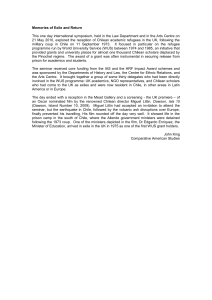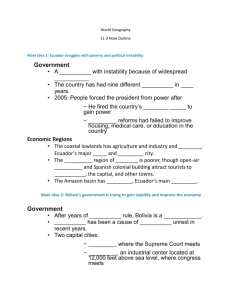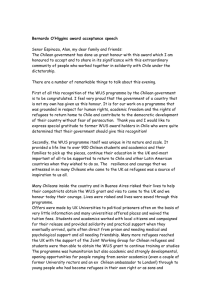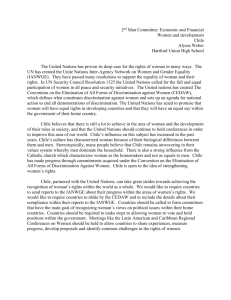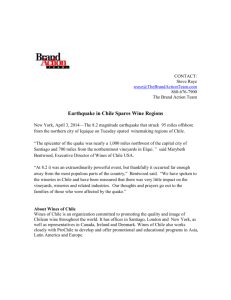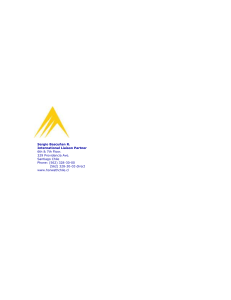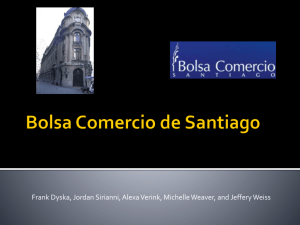1 May 2010 Academics for Chile
advertisement
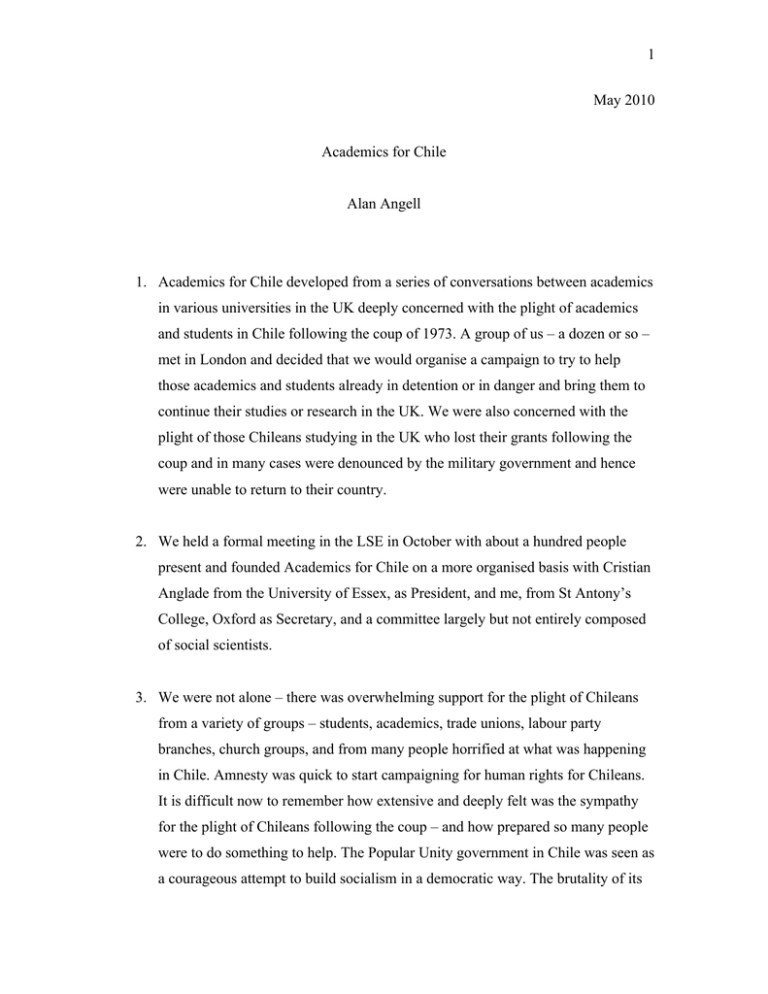
1 May 2010 Academics for Chile Alan Angell 1. Academics for Chile developed from a series of conversations between academics in various universities in the UK deeply concerned with the plight of academics and students in Chile following the coup of 1973. A group of us – a dozen or so – met in London and decided that we would organise a campaign to try to help those academics and students already in detention or in danger and bring them to continue their studies or research in the UK. We were also concerned with the plight of those Chileans studying in the UK who lost their grants following the coup and in many cases were denounced by the military government and hence were unable to return to their country. 2. We held a formal meeting in the LSE in October with about a hundred people present and founded Academics for Chile on a more organised basis with Cristian Anglade from the University of Essex, as President, and me, from St Antony’s College, Oxford as Secretary, and a committee largely but not entirely composed of social scientists. 3. We were not alone – there was overwhelming support for the plight of Chileans from a variety of groups – students, academics, trade unions, labour party branches, church groups, and from many people horrified at what was happening in Chile. Amnesty was quick to start campaigning for human rights for Chileans. It is difficult now to remember how extensive and deeply felt was the sympathy for the plight of Chileans following the coup – and how prepared so many people were to do something to help. The Popular Unity government in Chile was seen as a courageous attempt to build socialism in a democratic way. The brutality of its 2 suppression, added to the knowledge that the USA was involved in the coup, created a broad wave of sympathy in many countries throughout the world for the plight of those suffering repression. 4. Many campaigns of this nature have to work hard to drum up support. We by contrast had widespread support – so the challenge was to organise that support in the most effective way. Support on such a scale also meant that we received substantial financial support - until I started organising Academics for Chile I did not realise how important it was to have a firm financial basis. 5. The decision to have three separate organisations – Solidarity, Human Rights and Academics for Chile - was not the result of a carefully thought out plan. It was a spontaneous response but created, I think, a very effective structure for all aspects of mobilising support for Chile. Coordination came from the Joint Working Group for Refugees from Chile which brought these and other groups together. 6. Having a separate organisation meant that Academics for Chile could seek support from those who valued academic freedom but were by no means necessarily supporters of the UP regime. We secured a list of sponsors who, deliberately, were mostly establishment figures – Lord Kahn a prominent Cambridge economist, the Archbishop of Canterbury, Richard Keynes an eminent scientist and others – to show that we were appealing on the grounds of academic freedom in general and not because we as an organisation sympathised with the aims of the Allende government (even if of course many did). We also had support from the highly respected and long established Society for the Protection of Science and Learning – a source of much useful advice and help from its then secretary Esther Simpson. 7. If there was intense activity at the central level, there was equally intensive activity at the level of individual universities with both student unions and university senates raising money, waiving fees and offering places. Universities 3 all over the country from Aberdeen to Exeter participated in our campaign. Local organisations of WUS played an important part in mobilising and organising this support at the level of the campus. 8. But the amount of work was too much for me. I could not – even if I was devoting most of my time to Academics for Chile – cope with the level of organisation necessary and or deal with the financial aspects. I then turned to World University Service as early as October 1973, and went to see Alan Philips with a dossier of cvs, a list of pledges of support and a plea for help. I will leave Alan to deal with the role of WUS but I will add that the decision I made to go to WUS was absolutely right and I was profoundly impressed by the professionalism and commitment of those who worked on the Chile programme. 9. A real boost to the campaign was a generous grant from the Ford Foundation which provided discretionary money to supplement the offers made by universities, and it showed that we were running a programme that an important charity considered worthy of funding. From this grant WUS was able to fund the initial appointment of an administrator, Liz Fraser, to run the programme. 10. Funding on a major scale became available to the programme after the election of the Labour government in February 1974. Judith Hart as Minister for Overseas Development agreed to divert British Council funds going to Chile towards WUS – in the face of not overwhelming approval from her civil servants and opposition from some members of her own party. 11. I have concentrated on the British end of the story but that of course is only a small part of the whole process. Countries all over the world organised programmes to help refugees from Chile. But we all depended on Chileans who were prepared to run grave risks to themselves to help others. The Catholic and other Churches in Chile, initially through the Comité pro Paz and then through the Vicaría de la Solidaridad played a major role in defending human rights in Chile 4 and in assisting us in our efforts to bring over those academics and students in danger. 12. We were greatly assisted by those Chileans already studying in the UK who played a key role in advising us, organising campus support, and helping their fellow citizens when they arrived in the UK. Those who came early played an important role in helping us to bring over others. Their individual stories of suffering aroused great sympathy and reinforced determination to try to help those still in Chile. 13. We depended on institutions such as FLACSO in Chile and CLACSO in Buenos Aires to provide us with the details of those Chileans in need of assistance – and, and this is important- able to benefit from a university course. Universities in the UK were sympathetic but required that those who came were suitably qualified to study. In this we were helped by the high educational standards of Chilean universities. I believe if I remember correctly the details that the cohort of Chileans who came had a record of educational achievement more or less the same as the cohort of British students studying at the same time. Our first response was essentially humanitarian, but it became clear especially after WUS took over that we had the opportunity to train Chileans who could eventually return to their country and contribute to the development of a future democratic country. 14. Once WUS took over, Academics for Chile provided many of the members of the various committees to organise the process. I represented Academics for Chile on an umbrella organisation of OXFAM. CAFOD and CA which had a grant from the UK government to develop programmes in Chile. Support from many agencies worldwide and from many countries – Holland was particularly generous - allowed Chileans to create research institutes that provided a relatively safe haven where they could work on policies for a future democratic Chile. When return to Chile became easier after 1983, WUS grant holders returned to take up 5 prominent positions in several of these agencies – and later to occupy senior posts in the democratic governments after 1990. 15. But not all Chileans returned, and those who remained played an important role in campaigns for human rights and not just in Chile or Latin America. Several former refugees went on to occupy senior posts in a number of universities in the UK. 16. I don’t think we ever dissolved Academics for Chile organisation formally. We individually became involved in the activities of WUS and at the level of our universities and even managed to return to some of the academic functions for which we were paid. 17. The whole experience was essentially collaborative. I feel proud of what we were able to achieve and by we I refer not just to Academics for Chile but for those who worked so tirelessly in the Campaign for Human Rights and in the Chile Solidarity Campaign.
